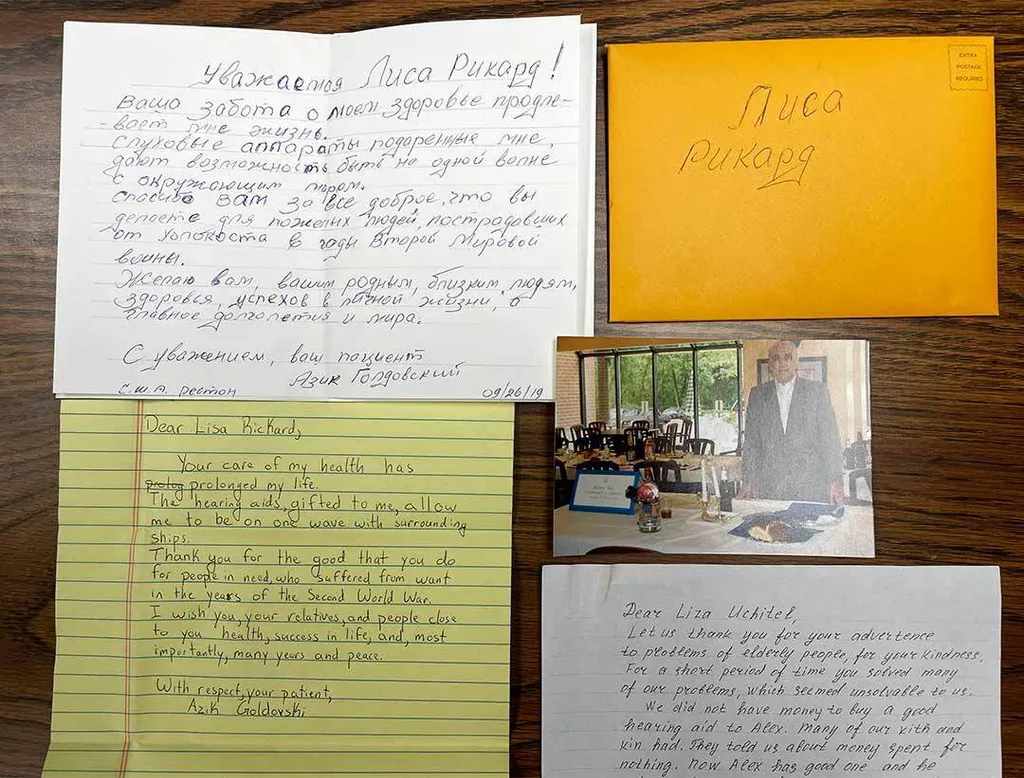- May 04, 2022
- By Rachael Grahame ’17
As children or young people primarily living in the Soviet Union while the bloody tides of World War II swept over Eastern Europe, clients of the Jewish Social Services Agency (JSSA) in Rockville, Md., had to gather whatever they could carry and flee at a moment’s notice, or to dig mass graves in the woods near their homes for community members murdered by Nazis.
Fast forward to today, and the University of Maryland’s Hearing and Speech (HESP) Clinic and JSSA have helped more than 150 of those Holocaust survivors, who made new lives in the United States and now reside in Maryland and Northern Virginia. At no cost to the clients, the JSSA and HESP Clinic have been testing survivors’ hearing and fitting them with hearing aids since 2015.
“I am so very grateful to you for such heartfelt tenderness and warmth that you have shown me. You brought comfort and helped improve my quality of life,” said one survivor, Vladimir Bakaleynik, who asked JSSA Holocaust Survivors Program Manager Deborah Adler to pass on his thanks to HESP Clinic personnel.

Much of what is shared with Assistant Clinical Professor Lisa Rickard and her clinical audiology doctoral students—from family photos to wrenching stories of loss and hardship—is done with the help of case managers or relatives who can interpret Russian.
“I love this population,” said Rickard, the faculty lead for the program. “They've survived unthinkable atrocities during WWII, yet they are the most resilient people I’ve ever met. They’re smart and they’re funny—they still have a sense of humor despite what they’ve been through—they’re really an amazing group of people. It’s been such a privilege and honor to get to work with them.”
Azik Goldovski, another client whom Rickard has helped, sent a photo of himself with a card written in Russian. Part of the translated note reads: “The hearing aids gifted to me allow me to be on one wave with surrounding ships. Thank you for the good that you do for people in need, who suffered from want in the years of the Second World War.”
Another moment of gratitude that’s stuck with Rickard is when a woman who barely spoke English and had just received her hearing aids said to her, “Oh thank you, thank you. You give me wings.”
Before the COVID-19 pandemic, Rickard would receive a client’s hearing test from another audiologist, procure hearing aids from one of several companies that agreed to donate them, and go to the JSSA office in North Bethesda with a wide range of manufacturer-specific parts and tools to do the hearing aid fitting.
Today, the clinic gets most hearing aids from a company called Oticon, and JSSA provides transportation services to UMD for interested survivors, a pandemic-driven shift that occurred when the clinic reopened sooner than JSSA offices. The clinic also recently began to accept Blue Cross Blue Shield (state and federal), United Healthcare, Medicare and Medicaid insurance plans, allowing it to conduct its own hearing tests.
“This is just one more opportunity for our students to get the clinical training they need—to learn how to modify test procedures due to a language difference or memory or cognitive issues—but also a special opportunity for students to interact with a population that's not going to be here forever,” said Rickard.
This isn’t lost on Anhelina Bilokon Au.D. ’24, granddaughter of a Holocaust survivor and a Ukrainian-American clinical audiology doctoral student who helps translate for patients who need it—a service she hopes to make official by obtaining a Ukrainian/Russian language proficiency certification
“This is an incredible opportunity to care for a community so dear to my heart,” she said. “Having access to hearing technology has a tremendous impact on our JSSA patients, and it significantly improves their quality of life. We are so happy to have had resources to help bring conversation and social interaction back to their lives.”
